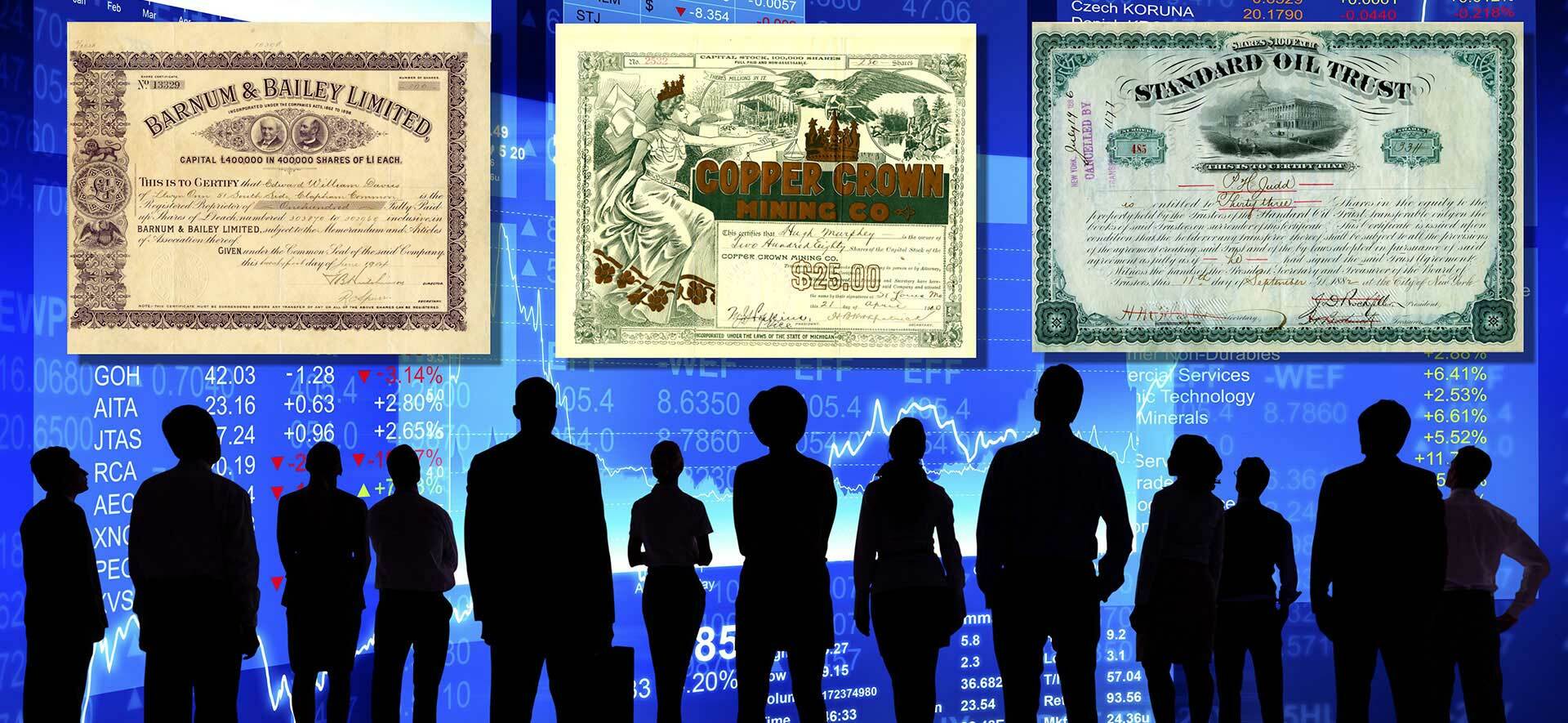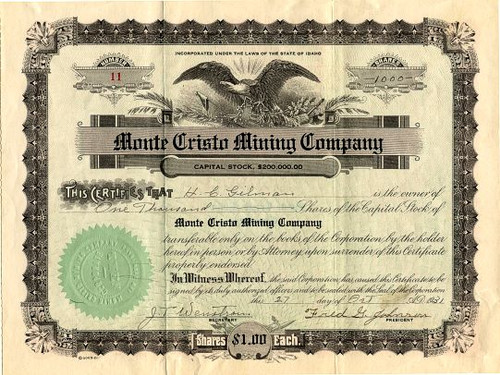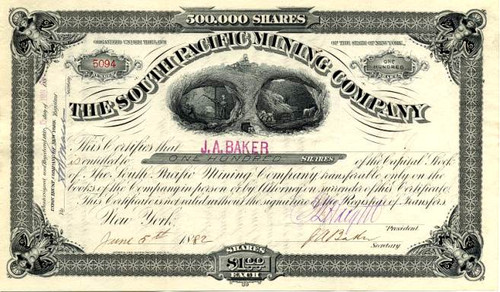Beautifully engraved Certificate from the famous New Monte Cristo Mining Company issued no later than 1929. This historic document was printed by the Jeffries Banknote Company and has an ornate border around it with a vignette of the company's logo. This item is hand signed by C.C. Julian, the company's President and H.B. Flasher as secretary. This certificate is over 94 years old.
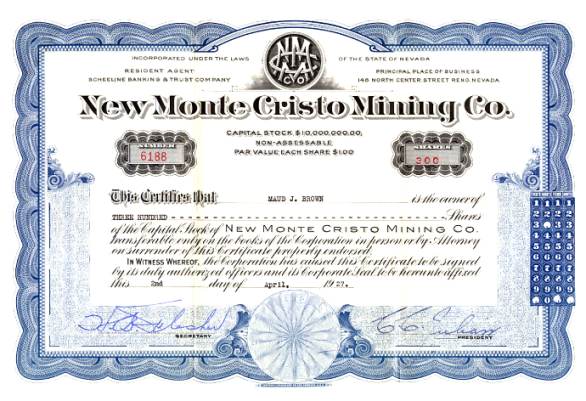
Certificate
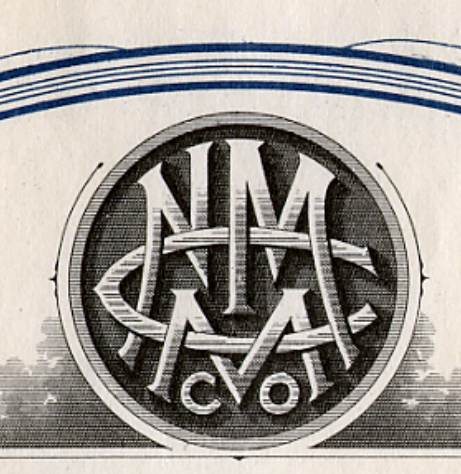
Certificate Vignette
The New Monte Cristo Mining Company was incorporated in the State of Nevada. Signed by C. C. Julian president and H. B. Flasher secretary. C. C. Julian was a swindler from Los Angeles which led to the largest financial fiasco in Southern California history. In fact, he was the main character of the book "The Great Los Angeles Swindle". In 1922, C.C. Julian (Courtney Chauncey), a Canadian, formed a company to drill for oil in the Santa Fe Springs field in Los Angeles. Discoveries of oil in the Los Angeles are created a lot of hype and speculation. Buying and selling of these properties drove up values rapidly and create opportunities for con men like Jullian. Julian, who had speculated in land in Canada's expanding western provinces and later worked as an oil field worker, knew this was ripe. C.C. Julian borrowed money and took the company public. Julian proved to be an expert at understanding (and answering) the fears of small investors. He used an unorthodox scheme, selling "units" in a "common law trust," promoting this as preferable to the allegedly unscrupulous world of stocks. He pioneered new marketing methods by taking out newspaper advertisements which he himself wrote in a "home-spun" style, full of folksy sayings, and pitched towards people suspicious of big monopolies and corporations.
They emphasized the "scarcity" of the offer ("Only Four More Days!"), adding to its appeal, while promising great returns on investments. As assurance that he wasn't one of the "Big Boys" or a crook, he touted the offer as a risky venture: "Widows and Orphans, This Is No Investment for You!" proclaimed one ad. He succeeded in extracting hundreds of thousands of dollars from many people, both rich and poor. Julian immediately started new ventures on much the same basis, even before his first wells had revealed their worth. His Julian #1 well started a copious flow of oil in March, 1923. Julian, not unlike other small oil outfits, immediately made plans to unseat Standard Oil, still a monolithic monopoly controlled by the Rockefellers. In May Julian incorporated the Julian Petroleum Company in Delaware with 200,000 shares of preferred stock worth fifty dollars each, plus 200,000 shares of common stock that had no formal value. I
n June he announced that half of the stock would be sold with an initial price of $50. He soon ran afoul of Edward Daugherty, the California Corporation Commissioner. This was a newly established office (1913) which was created to control fraudulent promoters. In October of 1922 Daugherty started regulating companies selling "units" (which the promoters claimed exempted them from his jurisdiction); a flurry of court actions and new legislation supporting Daugherty followed, and Julian Pete was crippled financially. An apparent loophole led to a quick train trip to Las Vegas and a sale of stock from the company to C.C. himself. On June 28th he sold some $200,000 worth of stock. On the 29th Daugherty shut down trading, suspended C.C.'s brokerage license, seized the company's books, and had C.C. arrested. After paying the $3,000 bail in cash, C.C. continued business by borrowing money (solicited by ads in papers) and finally in late July obtained permission to sell 100,000 shares of stock if he himself resigned from the corporation. He did so, but retained the common stock that gave him a controlling vote (neither fact was revealed publicly).
By going on with plans for a refinery, C.C. was able to present himself at a champion of the under-dogs against both an implacable bureaucracy and the oil monopoly. The birth of the company was indeed an omen of its future trajectory. After linking up with a Texan shyster named S.C. Lewis, Julian incorporated to create an oil refining company, The Julian Petroleum Company (or "Julian Pete" as it was known popularly). Lewis soon took control of Julian Pete. Among other strategies he applied was the hiring of the FBI accountant investigating the company. Julian's stock pumping led to an investigation by the California Corporation Commissioner and the stock tanked with police barricading Spring Coast Exchange to prevent the trading floor from being swarmed by angry investors. Julian filed suit against the commissioner and the Los Angeles Times. Julian decided it was time to acquire a few "real mines", which included the Monte Cristo in Arizona. He then consolidated these mines along with the Western Lead shares for shares in Julian Merger Mines Inc. These companies made up the reorganized as the New Monte Cristo Mining Company (This company was not affiliated with the famous Monte Cristo Mine in the Angeles National Forest just north of Los Angeles). The Western Lead Mines Company had accumulated about 50 claims in Titus Canyon and had bored a tunnel into a promising ledge. 24 hours after Western Lead hit the stock market 40,000 shares were sold and the Leadfield boom was on.
Once Julian took over, a road was built to the town site, the main mine tunnel was over 600ft deep with up to 30% lead and 7 ounces of silver per ton. In March 1926 a specially chartered train pulled into Beatty with 340 potential investors aboard, they were joined by others from Tonopah and Goldfield and a caravan of over 1000 people drove down to Leadfield. Julian quickly . By now Leadfield had a newspaper, general store, barber shop, restaurant, the Leadfield Hotel, and a post office. Everybody was happy, except for the California State Corporation Commission. The commission claimed Julian was selling stocks without a permit, but it was argued that Julian was selling personal stock, which didn't require a permit. Just as things were going gangbusters at Leadfield, the commission put a stop to Julian selling his mining company's stock. This happened just as the company hit the ore it was looking for, but this turned out to be low-grade ore. The company did not get a chance to search for higher grade ore. C.C. Julian later pulled off some scams in Arizona and Oklahoma with the C.C. Julian Oil & Royalties Company before he fled to Shanghai where he committed suicide in 1933. T
he scandal changed the state's banking industry for ever, influenced state law and helped alter the political face of Los Angeles and Southern California by reinforcing the powers of the regulators and more liberal reformers. San Francisco's Bank of America was also a real winner, for the scandal broke several banks in the southland (some of which were ultimately acquired by B of A) and changed the laws that had kept the northern bank to a very limited business in the LA region.


